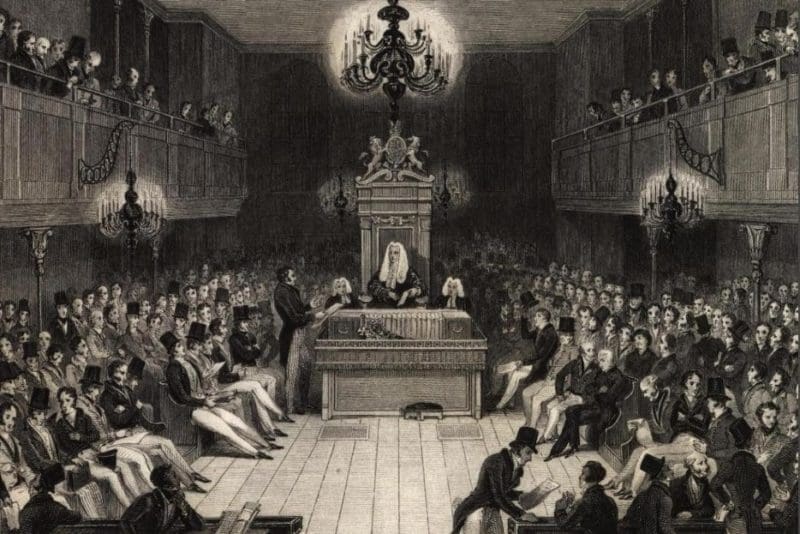A decade or two ago, researchers in the fields of statecraft and political science had almost buried the concept of sovereignty, or more precisely, it was considered worthy of study only from a historiographical or national-historical perspective. Typically, two arguments were raised against employing the concept of sovereignty in the social sciences. One was the inflated use of the term. Considering that from artistic sovereignty to scientific or even athletic sovereignty, the term was used in so many contexts—where it was essentially synonymous with the concept of autonomy—the word’s affiliation with the nation state had faded considerably. The other reason, and the more interesting one for us, was that from the second half of the twentieth century onwards, as a consequence of their various international treaties and activities in international organizations, states no longer had the absolute sovereignty that had been so apparent in the nineteenth century. Both of these arguments ought to be considered.
Inflation in the use of the term has indeed been spectacular, and this is something journalism excels in. It is also undeniable that the sovereignty of states embedded in international political and legal systems is more limited than it was in the eighteenth and nineteenth centuries. On the other hand, the political debates of the last half decade show that the concept of sovereignty has revived in the political public, not only often featuring prominently, but becoming a fundamental concept, thus also a divisive concept, in the debates of political parties and states. We can say that an either–or situation has arisen: political campaigns either proudly fly the sovereignty flag or seek to downplay it. As the situation has changed, the legal and political sciences can no longer afford to simply say that this is an outdated concept. It must be assumed that this concept has become part of public thinking again, so the question is: in what context, from what motivation has it arisen?1
Examining the current range of problems concerning sovereignty, it is clear that we find ourselves in a rich conceptual thicket. The differences and similarities between the rule of law and the Rechtsstaat need to be addressed, not least because in matters concerning the European Union, which is not a state, only the rule of law can be debated, while member states are typically bound by the constraints of the Rechtsstaat. The conceptual history of sovereignty, the historical change in its meaning and subjects, the question of the division of sovereignty between the EU and the member states, and the interpretation of democracy and its relationship to the republic must be examined. I do not propose to undertake all of this in this text, I merely wish to indicate the more important connections.
Appearance and Initial Content of ‘Sovereignty’
If we examine the intellectual history of sovereignty, we can observe several clearly defined periods. The first theory of sovereignty was formulated by Jean Bodin (Les Six Livres de la République, 1576), who linked the concept of sovereignty to the state. In principle, absolute power could be exercised by an individual or a group, but Bodin stood by the former, designating the king as the wielder of sovereignty (supreme power). He believed that only a ruler with absolute power could protect the country from anarchy, which is more terrible than any tyranny. Bodin wrote his book with the St Bartholomew’s Day massacre still fresh in his mind, and so he considered the unity of the state—which is the guarantor of peace—to be paramount; the struggles of religious affiliation could not be allowed to throw it into turmoil. The sovereign state is therefore politically neutral on the issue of religion. What is needed, in Bodin’s view, is not religious unity, but a unified state. Huguenots were confronted in political publications not on religious grounds, but to preserve the sovereignty of the state. Bodin did not stress state violence, but rather the rule of law. It is not that law takes precedence over power, but rather that law is the principal instrument of power. This is clear from Bodin’s discussion of the fact that the most important criterion of sovereignty is legislation. Though laws ought to be fair and reasonable, their validity does not lie in justice or rationality, but in the will of the sovereign.
Bodin, therefore, did not write his work in defence of faith, but in defence of the state. He saw in single, indivisible sovereignty the possibility of preserving peace (Hobbes arrived at similar conclusions). From the point of view of peace, the worst evil to be avoided is civil war. Sovereignty is the full power that enacts and abolishes laws. Still, in Bodin’s view the sovereign does not possess unlimited power because he cannot violate either divine or natural law, thus in this context private property must be respected, he may not change the kingdom’s order of succession, nor may he alienate its goods.
‘The fundamental questions, however, have always been the same: who holds overall power, and what are the substantive characteristics of that power?’
In the century of the Enlightenment, British constitutionality came to view Parliament as the embodiment of sovereignty, while in post-revolutionary France it was embodied in the people, and later the nation. The fundamental questions, however, have always been the same: who holds overall power, and what are the substantive characteristics of that power? Whether it is the king, the parliament, the people or the nation, in each case the activities of the said principal powers were expressed through the existence and operation of the state, and it followed that in the nineteenth century, sovereignty came to be seen as embodied in the state, a view which was first substantially articulated by Georg Jellinek.2 As can be seen, in practice we can only speak of personal sovereignty in the case of a king (or more broadly a monarch, e.g. a dictator), while in other cases a collective entity (people, nation) or institution (parliament, state) expresses sovereignty.
As a point of departure, the following definition may suffice: sovereignty is the supreme power of a state over a territory (territorial sovereignty) and the population living there (personal sovereignty) who obey the state supreme power. Linked to this obedience is a distinction between the political and legal interpretations of sovereignty. In political terms: they are, in practical terms, obeying. In legal terms: they are obliged by law to obey. The legal concept of sovereignty is thus based on the premise that law defines sovereignty and in consequence, of course, limits its scope. Austin’s well-known maxim on the indivisibility of sovereignty primarily expressed that what is defined as sovereignty must be held exclusively by one power. In other words, the law cannot endorse several different, and therefore competing, sovereigns. Indivisible sovereignty does not, however, imply boundless power, since moral and religious norms may place limits upon sovereignty, but these do not constitute an independent sovereign.
At most, we might refer to God as the power limiting the sovereign by the (moral, legal) laws of nature, though this would involve God in worldly political life, contradicting the doctrine of transcendence. God therefore limits sovereignty, but the concept of sovereignty cannot be applied to Him. Furthermore, in this context, it should be noted—and this demonstrates that power and sovereignty are not interchangeable terms — that the spread or even incorporation of the principle of the separation of powers into the structure of political systems does not necessarily mean the abrogation of the concept of sovereignty. Indeed, when we view the state as the embodiment of sovereignty, the division of power within the state system does not mean a restriction of sovereignty, but leads rather to a phenomenon of shared sovereignty. By the second half of the nineteenth century, as mentioned, the state was already spoken of as the embodiment of sovereignty. The state, however, is an impersonal concept, and Carl Schmitt and Hermann Heller, seeing this progressive depersonalization, criticized it.3 Schmitt saw this as underpinned by a mechanistic world view rooted in the Enlightenment, in which social life was perceived as analogous to the search for and codification of laws within the natural sciences. The most obvious form in which depersonalization manifests itself is in the spread of the rule of law doctrine. Hans Kelsen, who lived during the era of the Weimar Republic in Germany, welcomed this process.4 His conception of law, which was based on the hypothetical basic norm, very precisely and radically expressed this depersonalized absence of subjectivity.
From the last decades of the twentieth century, two different experiences overshadowed the traditional thematization of sovereignty. On the one hand, the proliferation of the term, at least in Hungarian, meant that it came to be used in very different contexts. It applied to both the individual and different communities, and to different areas of activity (e.g. art, politics, science, etc.), which significantly blurred its range of meanings. We read about sovereign individuals, sovereign artists, and sovereign scientists, and sometimes even come across this concept in the world of sports. In short, therefore, it has gone from a concrete noun to a general attribute, one which is broadly synonymous with the term autonomy.
On the other hand, in addition to the intensification of integration efforts, the thematicization of globalization emerged, focusing, as we have seen, on how embedded states are in cross-border networks across economic, political, and legal fields. This is generally not presented primarily in terms of sovereignty, but in terms of the requirement to embrace these networks. On the basis of all this, by the turn of the millennium the problem of sovereignty had been pushed into the background in scholarly research. Or more specifically, it was only dealt with historically and critically. However, in 2015, the concept reappeared.
Sovereignty in the European Union
The change within scholarship was inspired by changes in the world of politics. In politics, the central question of the last half-decade has been whether European integration should lead to the United States of Europe or whether it should remain conceptually a Europe of nations. Can sovereignty even be understood within the context of the EU? But then, the order of governance within the Union is based on treaties: the treaties of sovereign states. Where can we find sovereignty? At the level of nation states or the Union, or perhaps both? If it is the latter, however, then the division of sovereignty must be precisely defined.
In any case, we can state that the content of sovereignty today is different from that which animated nineteenth-century states. In the decades following the Second World War, sovereignty was limited by the competencies of organizations established as a result of international treaties and integration policies. However, the renunciation of sovereignty is always partial, and subject to conditions based on the sovereign decisions of a nation state. The fact that the content of sovereignty differs from the situation a century and a half ago has not made the concept redundant.
Perhaps the current examination of the issue of sovereignty is considered so complicated precisely because of what that sovereignty means for political structures. In a political sense, the sovereign is the decision-maker over whom there stands no other, higher political force, nor another equivalent, competing factor, and whose will prevails unconditionally.
As the last few years have brought with them the uncertainties of the single, common integration policy in the EU and the resulting polarization, this of course also means that the concept of political sovereignty does not homogenize, and cannot be applied exclusively to either the EU or its member states, as the struggle between federalist and confederalist tendencies divides the European Parliament itself as much as the member states’ own legislatures. This phenomenon is characteristic of Europe as a whole, and varies from place to place only in intensity and proportion. As far as the legal side of sovereignty is concerned, the number of authorities which would not recognize the existence of a European supranational legal order in the context of the Union is negligible. Again, the question concerns the extent to which such a legal order can override member states’ own legal systems and constitutionality, so that typically it is not the existence of European law which is ultimately called into question, but rather the extent of its powers. European law is a field of international law that has existed for decades, and which—given that in the absence of its own political body or statehood, it cannot itself be sovereign—is an example of how ‘non-sovereign’ institutions can limit the legal sovereignty of nation states. The EU is based on the founding and amending treaties between the member states, which give it legal personality. These treaties confer certain, otherwise national, competences on the European Community, which can thus decide on these matters with the participation of the member states, and it does not always require the unanimous consent of member states to do so. The external sovereignty of member states is thus, on the one hand, meaningfully diminishing in size, since the process is in fact a zerosum game in this respect, while on the other hand, the EU’s decision-making competence proportionately increases.
‘In any case, we can state that the content of sovereignty today is different from that which animated nineteenth-century states’
That is why it is interesting that the EU pays so little attention to the issue of sovereignty. One of the very first founding treaties, the 1957 Treaty of Rome, mentions the concept only in relation to Great Britain and Cyprus, but not in relation to the Community as a whole (of which the UK was not even a member at the time). Nor, more importantly, does it attempt to define the term.5 The concept remained outside the terminology of the EU’s founding documents for decades, and did not reappear until the 1997 Treaty of Amsterdam, forty years after the Treaty of Rome, and only as a concession to Denmark, since the Danish constitution stipulates that a ‘transfer of sovereignty’ is possible only with a four-fifths majority vote in the national legislature, meaning that ratification of the treaty would depend on it.6 The treaty itself does not mention this concept anywhere else. Other founding and amending treaties—namely, the Single European Act, and the Maastricht, Nice, and Lisbon treaties—also consistently avoid the concept. It logically follows that the EU has not been granted sovereignty by its member states, and the concept of sovereignty cannot be used in connection with it.
Neil MacCormick published a remarkable study on this subject, in which he considered the concept of post-sovereignty to be applicable to the current situation.7 This is because we cannot grasp the notion of sovereignty in a political situation where sovereign member states transfer powers to the EU, but at the same time, these transfers of powers do not cumulate in a new sovereign: in this respect we cannot speak of a zero-sum game. In MacCormick’s witty analogy, when virginity is lost, the other party does not obtain what has been lost. The sum losses (transfers of powers) on the other side could only be talked about if the EU became the United States of Europe. But that is precisely the question around which political debates revolve.
The right of peoples and nations to political self-determination is inalienable because of fundamental legal principles, just as no modern legal system recognizes the voluntary renunciation of legal capacity in the case of legal entities (the state itself is the primary legal entity). As such, the possibility of civil resistance always ultimately exists, in a legal sense, as a recourse of last resort, even if it is not always practically possible.
The example of Brexit has shown that this ‘ultimate’ restriction on sovereignty, which the European Court of Justice spoke of in 1964, does not appear in practice quite the same as it does on paper. The British were asked whether they wished to remain citizens of an EU that makes decisions without the consent of the member states, decisions which fundamentally deprive those member states of their sovereignty. The result is well known. Even if we accept that sovereignty will disappear with accession to the European Community, this does not mean that national sovereignty cannot be re-established at any time by a decision from the member state in question.
We have witnessed this for the last five years. The root cause that has intensified the debate between parties and governments is the experience of mass illegal migration and whether there is a link between this massive, uncontrolled entry into the territory of the Union and the increasing frequency of terrorist attacks committed by radical Islamists. Political forces which argued that these issues should be decided at a member-state level (strengthened in this belief by the fact that there was nothing but dither and delay at the EU level) articulated the concept of sovereignty, which simply meant decision-making competence based on national autonomy. Those opposing them, however, emphasized strengthening the EU’s institutional competences and, consequently, the devaluation and even disregard of the sovereignty of the member states. The concept of sovereignty has thus become the focus of political debates.
Representatives of the governments of the member states have referred in their arguments to the democratic mandate they gained in their own countries. In this debate, the concept of democracy is difficult to apply to the EU. Although the EU is made up of the political values of democratic member states, it appears, at least in part, as a non-democratic political apparatus in terms of its institutional system, as evidenced by the fact that the term ‘democracy deficit’, which had not been widely applied to other political entities, has frequently been employed in reference to it. We can only talk about democratic legitimacy in relation to the European Parliament, while other EU institutions only enjoy indirect, derivative legitimacy.
These issues were pushed into the background at the turn of the millennium, when the process of EU enlargement dominated the agenda, logically linked to the activities of the member states seeking to join. Political debates are not, as a rule, sharpened by periods of peaceful prosperity. That is why many believed that integration could be further strengthened by creating an EU constitution. However, both the French and the Dutch said no to this constitution, meaning that integration would have to be strengthened ‘by the back door’.
In fact, the EU has never really exerted itself to become too democratic. From a legal dogmatic point of view, a political community (while not itself a state) could acquire legitimate political sovereignty if its system were truly democratic. That is, in principle, popular sovereignty could exist where national sovereignty did not. The Union, however, does not show an outstanding, institutionalized talent for expressing the will of its citizens but rather, on the contrary, for disregarding it. Might the dissolution of sovereignty be precisely the aim? And if that is the case, and the member states surrender their sovereignty to EU institutions, then is sovereignty really gone? Can sovereignty be withdrawn from the state? The question then is: will the state remain? Or can any political debate be satisfactorily conducted? When the judiciary, the decisions of which formally evoke the dogma of papal infallibility, becomes the bearer of sovereignty, democratic legitimacy and transparency in the EU will be further diminished. Member states existed before the EU, and are likely to survive it. The EU, on the other hand, did not exist before its member states, and it is not clear whether it can survive at all.
The sovereignty of EU member states, though it may be sleeping, still exists. In terms of national self-determination, Hungary is actually a good example of this in the EU. Jhering argued that rights are won by those willing to fight for them, and it follows that rights not fought for are quickly lost.8 The Visegrád Group is thus in a privileged position, as our common history is about persistent fighting. The teeth of larger empires have already broken on this alliance.
Translated by Thomas Sneddon







